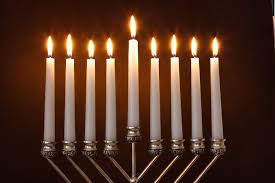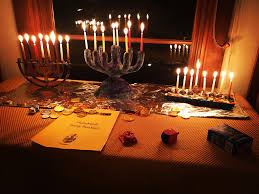We offer Eshet Chayil verses from the Book of Proverbs at the Shabbat Table. We are grateful for the “woman of valor,” the specialness of our life partner.
The Shvesters bring these verses to life in a beautiful song.
Shabbat Shalom
#BringThemHome
We offer Eshet Chayil verses from the Book of Proverbs at the Shabbat Table. We are grateful for the “woman of valor,” the specialness of our life partner.
The Shvesters bring these verses to life in a beautiful song.
Shabbat Shalom
#BringThemHome
Six13 shares its Jewish version of Defying Gravity.
Wishing you Chag Urim Sameach, Shabbat Shalom and the bringing of peace.
#BringThemHome
How do you light the Chanukah Menorah?
As you can imagine , this was a discussion among the Rabbis. The Talmud famously pits the House of Shammai against the House of Hillel, our preeminent first pair of rabbis.
, this was a discussion among the Rabbis. The Talmud famously pits the House of Shammai against the House of Hillel, our preeminent first pair of rabbis.
Do you light one candle the first night and increase another candle every night until all are lit on the eighth day?
Or do you light all the candles on the First day and decrease the number until you reach one candle?
Most of us know Hillel won that argument, so we increase the light with every passing day.
 Do you use Applesauce or Sour Cream when you eat latkes? They never decided on this argument, so we do both! (actually, I am pretty sure they never engaged in this discussion- I am making it up)
Do you use Applesauce or Sour Cream when you eat latkes? They never decided on this argument, so we do both! (actually, I am pretty sure they never engaged in this discussion- I am making it up)
Do you light one Menorah for the family, or does everyone get to light their own?
 Did you know the Menorah we use for Chanukah is called a Chanukiah? (it is an eight-light, plus Shamash, candelabra as distinguished from the seven-armed menorah used in the Temple).
Did you know the Menorah we use for Chanukah is called a Chanukiah? (it is an eight-light, plus Shamash, candelabra as distinguished from the seven-armed menorah used in the Temple).
Do you put the menorah in your front window for the community to view?
Why do I always seem to lack the right number of candles?
And when I buy candles on sale after Chanukah, I can’t remember where I put them for the next year.
Last but not least, is it Chanukah, Hannukah, or Channukah, Hanukah, Hanukkah, etc.?
We can get all caught up in both the fun and serious questions as we determine how we want to celebrate our holiday. But remember it is about celebrating the holiday.
It is a time of celebration and rededication. We remember the story of Jewish victory, which instilled pride in our heritage and gave us strength and confidence as we face seemingly enormous challenges today. We spend time with our family, sharing the light’s glow, the pleasure of the food, and the fun of the games. May your Chanukah be wonderous!
Chag Urim Sameach, Happy Hanukah!
Chanukah is almost here! Let’s start now with Watch Me by Six13.
A time for rededication to who we are shining light into the darkness.
Chag Urim Sameach
Shabbat Shalom
 The manger scene of the Baby Jesus swaddled in a Keffiyeh has created much commotion and attention. Even though the Vatican has removed the display, the consciousness-raising alone means that the image has had the intended effect.
The manger scene of the Baby Jesus swaddled in a Keffiyeh has created much commotion and attention. Even though the Vatican has removed the display, the consciousness-raising alone means that the image has had the intended effect.
We are talking front and center through religion about the plight of the Palestinian people.
This is not the first time someone has reinterpreted something for their own purpose. I have seen many iterations of Jesus: white, very white, swarthy, black. Many religions that have Jesus at the center of their theology have him displayed realistically on the cross, his body cradled in his mother’s arms, lovingly gazing down upon us in a portrait or looking upwards in an icon. As a babe in mother’s arms, as a man spreading the Word, at a bountiful supper, and as a martyr. And now swaddled in a keffiyeh. We use religious symbols to motivate the audience toward a vision or narrative. This is frequently for good and exemplary purposes and too often for malicious purposes.
The charge that this current manger display is Antisemitic is a particular, not universally shared Jewish perspective. Some deliberately embrace that evil message. I am sure that was not the intent of the Pope or the Church. And if the manger is allowed to be a message of hatred, it will have failed miserably in its mission.
Raising awareness of the plight of the Palestinians is important. Christmas is an essential Christian symbol of God’s love and our hope. Peace on Earth and Goodwill towards men is the universal message of the extraordinary celebration.
Can this awareness-raising symbol be channeled into constructive forces to promote the welfare of the Palestinian people, who have been victimized for too long? It is time for the people of goodwill to lay down their arms and reach out across the divide to each other. May love supplant the hatred that has kept both sides at war for too long. May the promise of Christmas resound in that troubled place of Jesus’ birth so that two people learn to live together in peace and security.
Merry Christmas!
 Although there is not a Genocide happening in Gaza, there is devastating suffering and death.
Although there is not a Genocide happening in Gaza, there is devastating suffering and death.
It can be stopped immediately. Declare peace. Accept the existence of Israel and Return the hostages. You can immediately focus on building a State of Palestine, and most of the world’s nations, including Israel, will support the enterprise. Outside forces of hegemony and oppression (Hamas, Iran, Hezbollah) that have imposed themselves are back on their heels, allowing Palestinians an opportunity for self-determination that has not been seen since 2000 at Camp David.
This is a pragmatic solution. Israel exists. Whether you question Israel’s legitimacy will not make the nation go away. Remaining belligerent only continues the harm to both Israelis and Palestinians. Negotiations are fraught. Negotiating requires leaving some things behind in exchange for other things we determine are more critical. Peace and a Sovereign State would be two extraordinary wins for the Palestinians. Peace is the only way for our children to know something beyond hatred and death.
It is time.
Prayer is universal. It transcends language, culture, and creed, uniting us in our deepest hopes and aspirations. This rendition of The Prayer blends its original message with the Hebrew translation by Rabbi Moshe Pomerantz z”l (1935-2024).
This Shabbat I share the beauty of The Prayer from Park Avenue Synagogue and Cantor Azi Schwartz.
Wishing you Shabbat Shalom.
May the hostages come home!
Greeting Shabbat as the evening comes, we sing a series of Psalms as part of Kabbalat Shabbat. Mikolot Mayim Rabim is a verse from Psalm written by the extraordinary Hazzan Jessi Roemer and performed by the also extraordinary Hazzan Harold Messinger.
Be swept up in the beauty of the sound and the images as we wish Shabbat Shalom to all.
Naomi Shemer is the poet who created Al Kol Eleh, All These Things, a bittersweet and timely song. As Yonina shares her music, let us continue to pray for the hostages to come home and for peace.